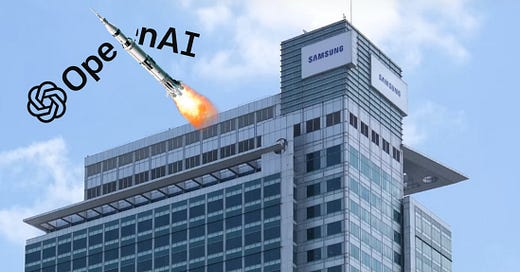Samsung Bans ChatGPT from the Workplace. Is this a Trend or an Anomaly?
Can you afford to ignore productivity gains?
Bloomberg reported that Samsung banned the use of ChatGPT and other generative AI tools like Bing Chat and Google Bard by its employees for work purposes. Samsung staff were notified of the new policy via a memo that was share with Bloomberg and later corroborated by a company spokesperson.
The move comes after news leaked in March that Samsung had identified at least three instances where company staff had added proprietary company information into a ChatGPT prompt. One instance involved database source code, another a chip manufacturing process technical solution, and the third included notes from an internal meeting. According to Bloomberg:
“Interest in generative AI platforms such as ChatGPT has been growing internally and externally,” Samsung told staff. “While this interest focuses on the usefulness and efficiency of these platforms, there are also growing concerns about security risks presented by generative AI.”
Samsung is just the latest big company to express concern about the technology. In February, only a couple of months after OpenAI’s chatbot service stirred up a storm of interest in the technology, some Wall Street banks including JPMorgan Chase & Co., Bank of America Corp. and Citigroup Inc. either banned or restricted its use. Italy also barred the use of ChatGPT over privacy fears, though it reversed its stance in recent days.
Samsung also told Bloomberg it was developing internal “AI tools for translation and summarizing documents as well as for software development.” Every business is quickly realizing that the value of these tools is too great to ignore.
However, it is questionable whether a company like Samsung, despite its technical prowess, will be able to create and evolve tools as proficient in these tasks as companies solely dedicated to the solution space. Over time, you should expect Samsung to have its own tools available but slowly relax the policy restrictions to allow the use of select third-party generative AI tools.
ChatGPT for Business
OpenAI acknowledged these corporate concerns in its blog post introducing its new data sharing and privacy controls (i.e., “incognito mode”) last week. The announcement included a reference to a new business user version of ChatGPT in development.
We are also working on a new ChatGPT Business subscription for professionals who need more control over their data as well as enterprises seeking to manage their end users. ChatGPT Business will follow our API’s data usage policies, which means that end users’ data won’t be used to train our models by default. We plan to make ChatGPT Business available in the coming months.
Trend or Anamoly
Do you remember when companies banned social media platforms? A 2009 Wired article reported that 54% of businesses banned social media use on corporate networks. In 2013, the Infosec Institute warned of computer viruses spreading through corporate networks that originated in an employee’s social media use while at work. The European Commission banned the use of TikTok on work computers in 2023.
Every internet site and software does pose a risk of inadvertent exfiltration of proprietary company data. However, it is generally a Sisyphean task to prohibit popular digital services, especially when they offer genuine business benefits for professionals.
Several companies announced bans or restrictions on ChatGPT use in January and February of this year. What is more notable is how few companies have followed their lead. Samsung is an anomaly. While Bloomberg reported that “nearly half” of corporate human resources professionals were drafting policies around generative AI, most of those policies will fall short of bans or significant restrictions.
Productivity Bonanza
The silver bullet in generative AI’s chamber is its ability to immediately deliver productivity benefits. Microsoft claims that GitHub Copilot users are more than 50% more productive after employing the solution. An MIT study of over 400 business professionals also found more than 50% productivity gains in writing output along with higher quality ratings for the written content.
Synthedia wrote in March about what is at stake regarding generative AI fueled productivity improvements:
In the 70 years leading up to 2018, U.S. labor productivity growth averaged 2.1% annually, according to the U.S. Bureau of Labor Statistics. Between 1998 and 2005, annual productivity growth was 3.3%. However, it was only 0.8% between 2005 and 2018.
Facing corporate budget cutbacks and uncertain economic prospects, companies are laying off workers and delaying new hiring. None of these companies want to contract revenue, so they are all looking for a way to do the same amount of work or more with lower staff counts and budgets. Generative AI tools such as ChatGPT may be the most effective way to achieve those goals.
The most likely outcome is a few more announced company bans, followed by new features such as ChatGPT Business and startups focused solely on these needs, which promise more corporate privacy and security controls. Companies won’t turn away productivity gains indefinitely, especially in our current economic climate.
ChatGPT Introduces "Incognito Mode" and Will Launch ChatGPT Business Features
OpenAI today announced a new set of data sharing and privacy controls for ChatGPT that are already available to users. You may be aware that ChatGPT added a prompt history that can be accessed in the left sidebar. It remembers your prompts and ChatGPTs responses so you can access them later.







